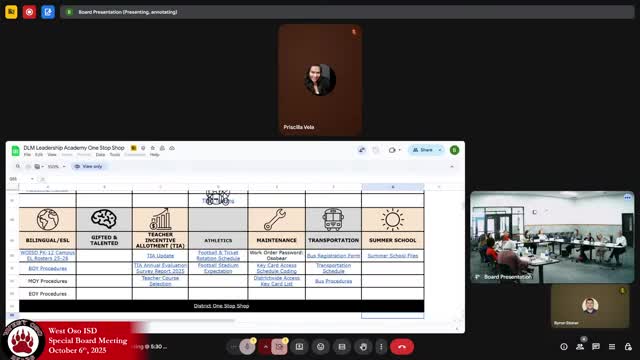Administrators detail DAEP placement rules: who can recommend, parent rights and hearing procedures
Get AI-powered insights, summaries, and transcripts
Subscribe
Summary
District administrators reviewed the district—s procedures for placing students in the disciplinary alternative education program (DAEP/DAP), clarifying who may recommend placements, the role of manifestation determinations for special-education students and post-hearing documentation requirements.
District administrators reviewed the district—s procedures for placing students in the disciplinary alternative education program (DAEP, referred to in the presentation as DAP), clarifying who may recommend placements, special-education protections and post-hearing recordkeeping.
The recommendation and hearing process
At the strategic roundtable, a presenter identified as Miss Dallas said the only people authorized to recommend a DAP placement are a campus principal or assistant principal. "The only people that can make the recommendation for DAP is either the campus principal or the assistant principal," Dallas said. She described a formal hearing process and explained that parents are notified immediately of allegations and intended disciplinary action.
Special-education protections and manifestation determinations
Administrators reiterated that if a student is served under Section 504 or receives special education, additional procedural safeguards apply. Dallas said a manifestation determination review must take place before a student with an Individualized Education Program (IEP) can be removed to DAP and that consequences for 504 students cannot be finalized without required steps. "If a student any student that is gonna be recommended to the EAP, they cannot leave the campus without having the manifestation determination," she said.
Hearing officers, documentation and post-placement steps
The executive director of safety, security and student services was named as the primary hearing officer for appeals; if that person was involved in the removal, appeals would be heard by another administrator. Dallas said all DAP hearing documentation and the student—s schedule and special-education information must be entered into the district—s student information system (Ascender) and shared with DAP teachers so services continue.
Placement timing, early release and late-year restrictions
Administrators said DAP runs on a modified daily schedule (teachers said the center opens at 8 a.m. and ends at 3 p.m.). Dallas described early-release decisions as the DAP administrator—s responsibility and explained that the DAP hearing informs parents and students of the criteria required for an early release review.
The presentation also addressed late-year placements: administrators said students will not be accepted into DAP during the final two weeks of school; the presenter read a date range in the packet that was unclear in the record (presenter cited "May 18 through the 20 eighth"). The district said students recommended during that two-week window will remain in in-school suspension and begin a placement the following school year.
Operational details: staffing and security
Administrators named Reggie Moreno and Annie Truman as the DAP teachers and said the district replaced a private security guard with a police officer role that can serve junior-high and high-school students. The presentation described daily routines, restricted privileges (students in DAP may not attend school events while placed), use of vape sensors in restrooms and assigned seating to limit graffiti and misbehavior.
Why this matters
The board was shown how district procedures are intended to balance student rights, documentation requirements and campus safety while preserving special-education protections. Administrators said clearer rules and consistent documentation help maintain due process and ensure continuity of services for students placed in DAP.
What the district will monitor
Administrators said they will continue posting DAP documentation in Ascender, ensure DAP teachers receive required records, and enforce the late-year placement restriction for the school year covered in the packet.
